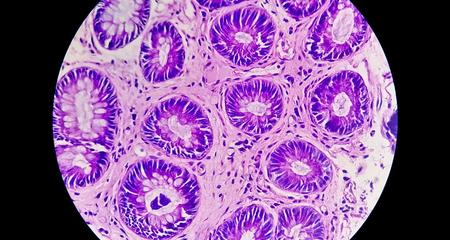Appendix cancer is any one of several different cancers that originate in the lining of the appendix. These cancers vary from benign tumors and slow-growing cancers to more aggressive disease. Physicians do not know what causes appendix cancer, and they have not identified any avoidable risk factors. Appendix cancer is also known as appendiceal cancer.
All forms of appendix cancer can spread to the abdomen, where they can lead to pseudomyxoma peritonei (PMP), a condition in which the abdominal cavity becomes filled with a jelly-like fluid. Appendix cancer is the most common cause of PMP.
Overall, appendix cancer is a rare disease. Only about 1,500 new cases are reported in the U.S. every year. The Froedtert & MCW Clinical Cancer Center at Froedtert Hospital campus is one of the nation’s leading centers for appendix cancer diagnosis and treatment.
Diagnosing Appendix Cancer
The appendix is a thin pouch-like tube attached to the beginning section of the large intestines. For about one-third of patients with appendix cancer, the first sign of their disease is appendicitis. Other symptoms can include abdominal bloating and abdominal or pelvic pain.
Most cases of appendix cancer are detected incidentally. The cancer may be discovered during an appendectomy, or it may show up on imaging studies performed for another health concern. The gold standard for diagnosing appendix cancer is microscopic examination of biopsy tissue. Diagnosis can also be aided by computed tomography (CT), magnetic resonance imaging (MRI) and ultrasound.
Appendix Cancer Treatment
The treatment strategy for appendix cancer depends on tumor type, the health of the patient and other factors. Small appendiceal tumors can usually be treated with an appendectomy procedure alone. Larger tumors may require removal of the appendix, part of the colon and other nearby tissues.
Depending on the type and stage of the appendix tumor, patients may receive chemotherapy after surgery. Radiation therapy may be used to treat appendix tumors that have spread to bone or another part of the body. In this case, the goal of radiation therapy is to relieve symptoms.
For more advanced cases of appendix cancer that have spread to the lining of the abdomen, the standard of care is HIPEC. This cutting-edge treatment can improve outcomes for many patients and extend disease-free survival.
Virtual Visits Are Available
Safe and convenient virtual visits by video let you get the care you need via a mobile device, tablet or computer wherever you are. We’ll gather your medical records for you and get our experts’ input so we can offer treatment options without an in-person visit. To schedule a virtual visit, call 1-866-680-0505.
Recognized as High Performing by U.S. News & World Report
Froedtert Hospital is recognized by U.S. News & World Report as high performing in three adult specialties and 16 procedures and conditions, including cancer, colon cancer surgery and gastroenterology and GI surgery.More to Explore





